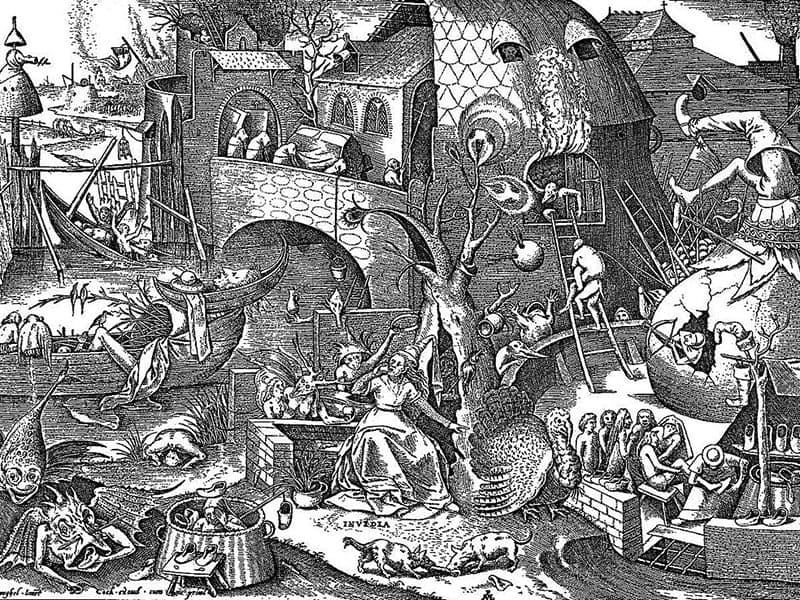On Thursday, millions of Americans will gorge on turkey, stuffing, mashed potatoes, gravy and pumpkin pie. Many of us will try not to make total gluttons of ourselves, as that is generally frowned upon. But why?
Sure, overeating leads to fat, but there’s a strain of Christian thought that says it also leads to a whole lot of other no-no’s such as lust, greed and anger. What is gluttony? Why is it considered one of the “Seven Deadly Sins” warned against by the Catholic Church for more than a millennium? How can gluttony — and its six brother “sins” — not only prevent us from enjoying the holiday but threaten our spiritual lives? Let us ’Splain …
What are the Seven Deadly Sins?
The Seven Deadly Sins make up the original Christian naughty list. Evagrius Ponticus, a desert father — a kind of Christian hermit — first identified eight deadly sins in the fourth century. He ranked them according to the seriousness of their threat to the spiritual life — gluttony, lust, avarice, sadness, anger, sloth, vainglory and pride.
Two hundred years later, Pope Gregory added envy to the list and cut sloth and vainglory (too much like pride, Gregory thought). He also re-ranked the sins — pride, envy, anger, sadness, avarice, gluttony and lust. The medieval church warned against these sins and countered them with seven “virtues” — faith, hope, charity, fortitude, justice, temperance and prudence — that would fend the sins off.
Why is gluttony among them?
Evagrius considered gluttony a sort of gateway sin — indulge in this and all the other sins will follow. “When the intellect is blunted by satiety,” he wrote, “it does not receive the knowledge of God.” Fun fact: Evagrius also considered gluttony “the mother of fornication.” Thomas Aquinas, in his “Summa Theologica” — still an influence on Christian thought — named pride as the gateway sin because it places man before God. Still, he was no fan of gluttony, either, concluding, “It is the inordinate desire of food that defiles a man spiritually.”
How are these sins supposed to be deadly?
Aquinas fleshed out the seriousness of the deadly sins, writing that because they must be engaged in knowingly, they are a purposeful rejection of God’s grace. Today, the deadly sins are often called “mortal sins” because they lead to a total separation from God.
In her book “Glittering Vices: A New Look at the Seven Deadly Sins and Their Remedies,” Rebecca Konyndyk DeYoung, a professor at Calvin College, describes the deadly sins, including gluttony, as things people pursue in the false belief that they — and not faith in God — will bring true happiness and total fulfillment.
“The Seven Deadly Sins are things that perennially tempt us because they look like fulfillment and we can get them for ourselves,” she said in a phone interview. “They are a kind of do-it-yourself happiness project.”
But medieval Christian thinking held that nothing earthly is the source of true happiness, so the church fathers preached against them. “You can’t find happiness in anything finite,” she said.
So, the thinking goes, become a glutton (or a lecher, a hothead, an envier, etc.) and go to hell. In the 1400s, a series of popular woodcuts showed the gluttonous dead being force-fed toads, snakes and rats by bands of fork-tailed devils, while Dante’s epic “Inferno” tells of a “third circle of hell” where gluttons, pursued by a giant stomach with three wormlike heads, lie about in a filthy, cold slush.
Mmmmm, pass the cranberry! What does this have to do with Thanksgiving?
It is this — almost every religion has some teaching about overindulgence. Don’t let a focus on the food, either as something to eat or something to throw, distract from the real meaning and purpose of the holiday: to be grateful for friends, family and what we have, rather than on what we have not.
“It is the sins of self-gratification that can cut you off from human relationships and influence the way you see the world,” DeYoung said. Then, referring to the teachings of another desert father about the deadly sins, she said, “If you poison the spring, everywhere the spring flows it takes the poison with it.”














